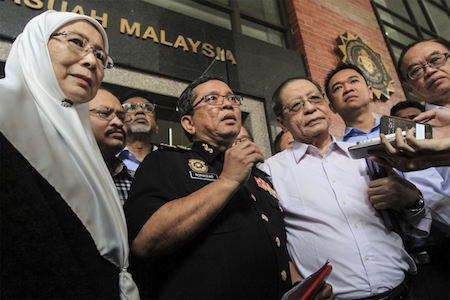(Malay Mail Online) – The Malaysian Anti-Corruption Commission (MACC) has rubbished a claim made by fugitive blogger Raja Petra Kamarudin that its investigation on Prime Minister Datuk Seri Najib Razak was a public relations gimmick intended to regain public trust.
The agency’s communications director Datuk Rohaizad Yaakob in a statement denied it “was out to get the PM” as claimed by Raja Petra, saying that the probe on SRC International and the RM2.6 billion donation received by Najib warranted an investigation under the MACC Act 2009.
“With reference to Malaysia Today, report by Raja Petra Kamarudin today, October 31, 2015 titled “When MACC literally gets away with murder”, the MACC would like to stress that public confidence and support towards the MACC had increased due to various initiatives and actions implemented by the MACC since 2009, long before the investigation on the Prime Minister.
“MACC also stresses that MACC is “not out to get the Prime Minister” as claimed by Raja Petra Kamarudin to boost the credibility and increase the public confidence,” he said.
Rohaizad added that the MACC does not depend on the case to increase its public confidence, but said the investigation was launched out of its moral responsibility.
“The issue of SRC International and RM2.6 billion are among several cases that has merit for investigation under the MACC Act 2009. Thus, MACC has the duty and the moral responsibility to carry a comprehensive investigation”.
Posting the article on his blog earlier this evening, Raja Petra claimed that former MACC deputy commissioner Datuk Seri Zakaria Jaafar had suggested himself that the probe on Najib was actually aimed at boosting public confidence towards the agency.
Zakaria had supposedly made the statement in an interview with online news portal The Malaysian Insider.
But the MACC maintained that it was on the right path of winning popular support based on its own reform initiatives, instead of relying on one high-profile case.
“Various strategies and approaches has been implemented including engagement with stakeholders to enhance the performance of MACC in a holistic manner.
“This further increases the transparency and professionalism of the MACC’s investigative process, which ultimately will increases public confidence in the Commission’s ability to effectively combat corruption,” said Rohiazad.
He added confidence level increased from 31 per cent in 2009 to 68 per cent in 2014, more than one fold increase since 2009.
“MACC’s numerous achievements and successes in the last few years is a formidable proof that the Commission is heading in the right direction. This is also achieved through the guidance from the five independent oversight bodies, formed under the MACC Act 2009,” he said.




No comments:
Post a Comment
Note: Only a member of this blog may post a comment.